How to Store Propane Tanks: 12 Safe & Effective Tips
-
- Last updated:
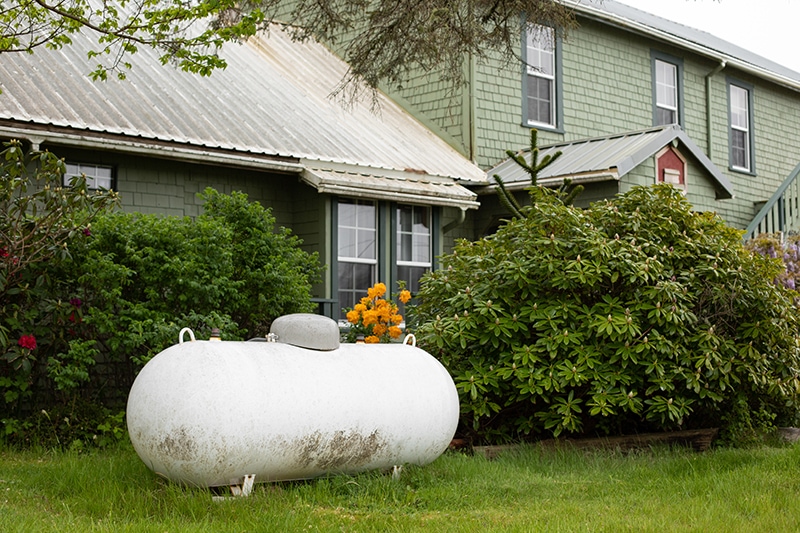
Propane is one of America’s most utilized fuel sources, given that it has a long shelf life and is stored easily. This is perhaps why over one million barrels of propane are used in the United States daily.1 Unfortunately, few people know the proper way to store propane tanks after use.
By adopting proper storage techniques, your cylinder can serve your household for years to come. Read on to learn more about the various tips for properly storing storage tanks to prevent house fires and increase the longevity of your tank.

Where Should You Store a Propane Tank
The ideal storage space for propane tanks is an open environment with plenty of ventilation. These fuel tanks should never be stored in an indoor environment because it is dangerous and a potential fire hazard. Sure, some may consider areas like a shed, a tent, a garage, or a basement as sufficiently ventilated, but these locations are still not ideal.
Here are a few tips on how to stow away propane tanks after use.
The 12 Safe Ways to Store Propane Tanks
1. Don’t leave your propane tanks in an enclosed space or a shed.
While storing propane tanks outside is safe, it is best to choose a spot away from your home and in a well-ventilated area. If the gas were to leak for whatever reason, it would contaminate the area, making it a dangerous environment. Even a single spark from a lawnmower or an engine backfire could ignite the gas and cause a devastating accident.
If you live in an area that experiences frequent snow, make sure you mark the spot it is located so that even if it is buried, you can easily find it and clear away the snow. Experts recommend storing propane tanks inside a tank box designed for storage and under a waterproof cover. Alternatively, you can store it under an open-air cover if you are worried about rust and tank damage from the elements.
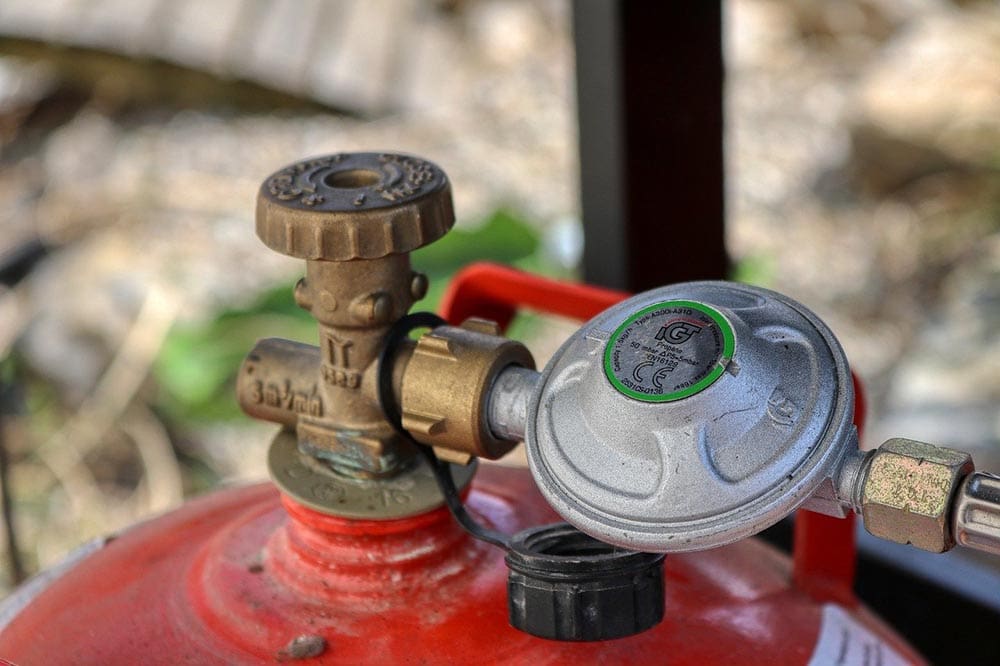
2. Store the cylinder in an upright position on a flat and dry outdoor area.
Ensure that your storage position is dry and flat so that water does not leak inside and the tank does not tip and roll over from any movement. The best position for the tank would be on an outdoor shelving unit that is secured to a wall or on the lower shelves.
Furthermore, you should store the propane tank in an upright position to ensure that the overpressure vent stays in contact with the propane vapor but not the liquid.
3. Ensure the propane tank stays above -44°F in cold months.
When environmental temperatures drop, so will the pressure in your propane tank. Therefore, during winter, store the tanks in a sunlit position so that it is warmed up every day to the ideal temperature levels.
Furthermore, do not cover your cylinder to insulate it. This not only blocks the sun’s rays but also lowers the pressure inside the tank. Heating the tank with a heater or other electrical device is also not recommended.
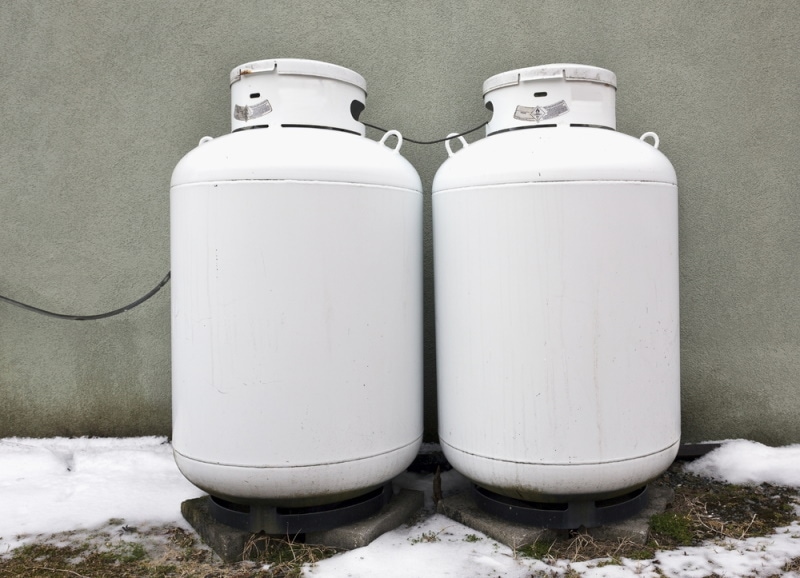
4. Propane tanks should not be kept in temperatures above 120°F in warmer seasons.
As the temperature rises in warm periods, the temperature inside your propane tank will also rise. In such hot periods, avoid leaving your tank in direct sunlight. Instead, try to find a shaded spot in your yard.
Propane tanks are designed with a release valve that helps reduce the pressure in the tank when temperatures rise. When temperatures are consistently high, the built-up pressure will leak from the valve and disperse in the air. If the tanks are near an ignition source, the excess pressure will light up and potentially cause a fire on your property.
5. Keep your propane tanks away from the windows and vents of your house.
Never use or store a propane tank inside your home. Since propane gas is denser than air, when it leaks out, it will settle near the ground, possibly spreading into basement windows or vents in your house. It could end up contaminating your indoor atmosphere, possibly creating an explosive mixture condition.
You should also ensure that the propane cylinders are stored away from radiators, air conditioners, or heat vents. These household fixtures could also suck propane gas into your home. If you notice the presence of propane in your house, evacuate the premises immediately and contact your local authority for assistance.
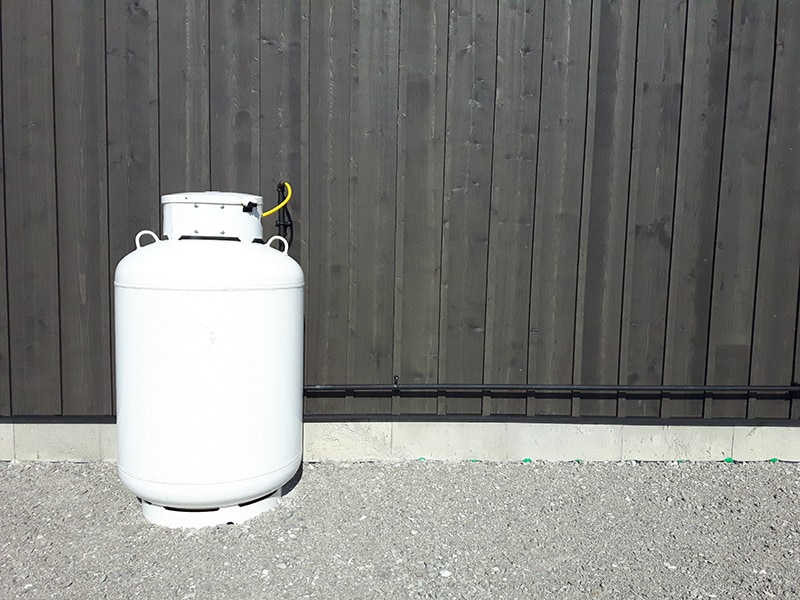
6. Position your tank at least 10 feet from any combustible materials.
Since propane tanks can experience leaks from high temperatures, you should store them away from flammable materials including electrical devices and open flames. You should also not store extra tanks close to each other or near a grill. If even a single tank happens to ignite, so will the rest of the tanks nearby.
7. Leave your grill attached to your propane tank.
This is a safe and easy storage method for propane tanks. Just make sure you turn off the valve located at the top of your tank and switch all grill valves to the “off” position. The grill cover can help protect the cylinder from direct sunlight and other weathering elements. This way, you can use your grill in any season.
However, if you prefer to store your grill in a garage or shed, unhook the tank, and leave it in an ideal position in your yard.
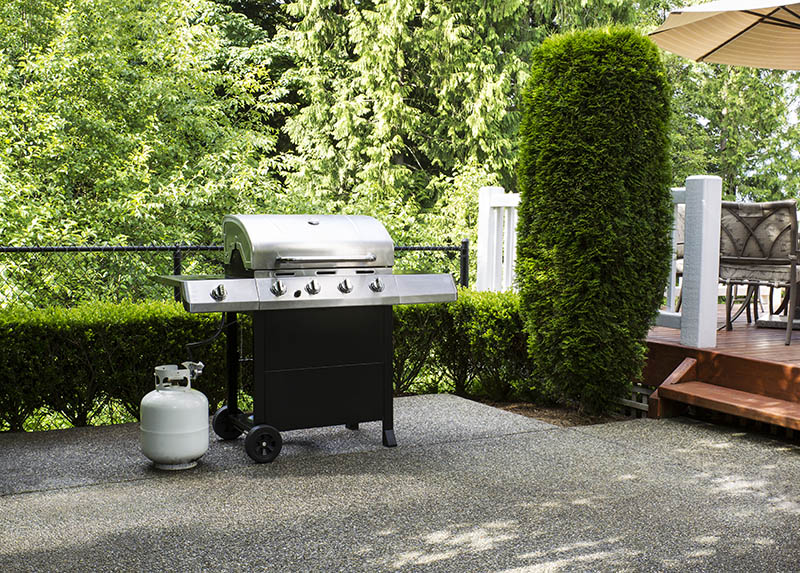
8. Hold the propane tank in an upright position using a milk crate.
Keeping the propane cylinder at an upright angle ensures that the release valve is not damaged and propane does not leak and dissipate in the air. One way you can keep the tank upright is by utilizing the standard milk crate. It can comfortably hold a 20-pound tank that is commonly used for gas grills.
If a milk crate is not a viable option, look for special platforms designed to store propane tanks, which are readily available online and in garden stores.
Alternatively, you can build a barrier around your propane tank with bricks or cinder blocks to secure it into place. Just make sure the handles and release valves remain exposed.
9. Close the valves whenever the tank is not in use.
To make sure that your valves are closed, turn them clockwise until your hand cannot move anymore. This prevents any possible gas leaks from the tank. If you notice the smell of rotten eggs in your tank’s storage area, propane may be leaking from your cylinder. Make sure to double-check that the valves are tightly closed.
However, if the leak occurs when the valve is turned on, chances are high that there may be leaking at the lines connecting to the propane tank. So, ensure you check for possible leaks along the flexible lines, possibly chewed on by rodents or mechanically damaged. If the connection to the tank does not properly seal or the fuel line is damaged, you should replace the tank.
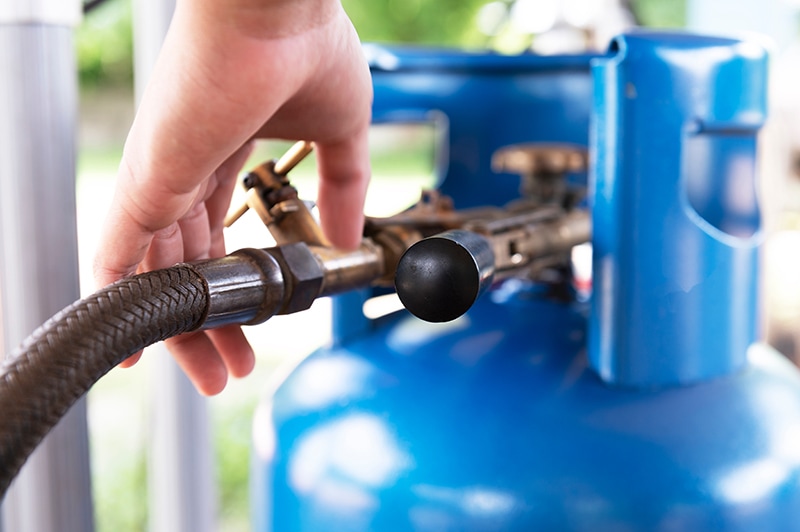
10. Check for rust under the shrink-wrapped plastic label.
Using a pair of scissors, remove the plastic wrap-around from your tank to see if the surface has rust. Sometimes water can be trapped under the wrapping, forming rust. If the rust is not detected on the onset, it can destroy the cylinder integrity. This would end up increasing its susceptibility to damage.
Be careful not to damage the label, as it features important handling instructions and graphics that you may need to check in the future.
11. Check the tank for peeling paint or dents.
If a propane tank experiences any sort of external damage, the overall integrity of the cylinder can be ruined. Therefore, it is pertinent that you check for any signs of peeling paint, dents, or rust before storage. If the cylinder exhibits signs of external damage, you should consider replacing it. Also, never refill a tank that has been damaged or weathered.

12. Tanks that have been in service for more than 10 years should be inspected by a professional.
Usually, propane tanks are stamped with an expiration date on the label. Any tank that has exceeded its expiry date should be re-qualified and checked to determine if it is still safe and viable to use.
Sometimes, the tank may not have external manifestations of damage but have internal wear and tear from years of usage. After the tank has gone through an initial inspection, make sure it is checked after at least every five years afterward. The inspector will then stamp the propane tank with a new expiry date.

Conclusion
As you may have gathered, the safest place to store your propane tank is outside, no matter the season. Some local laws may require special accommodations, but generally, it is perfectly fine to store your propane outside.
Just ensure the cylinder is stored in a well-ventilated environment and is protected from direct sunlight. Furthermore, storing the tanks in an upright position and on a flat surface is ideal for preventing potential leaks and external damage to the cylinders.
Granted, propane may be a very dangerous fuel source to use in your home. However, if you store your tanks as they are supposed to be, they should be able to heat your home and cook your meals for several years without any incidents.
Featured Image Credit: VDB Photos, Shutterstock
Contents

